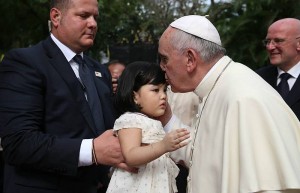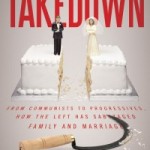Evangelii Gaudium offers us a key – the key in fact – to finding joy. Yet most of us remain in constant pursuit of pleasure.
And the world is most amiable, and most willing to please. Offering us an endless flow of temptations and idols and distractions from which we can draw our pleasure in an attempt to satiate our need for stimulation, our need for temporary relief, and our need – when you get right down to it – for love.
Now, many of us wouldn’t recognize real joy if it sneaked up from behind us – or, more to the point, came down to us from heaven above. Sometimes we simply fail to discern its voice because of an unceasing barrage of terrestrial noise.
As Francis wisely observed:
Sometimes we are tempted to find excuses and complain, acting as if we could only be happy if a thousand conditions were met. To some extent this is because our “technological society has succeeded in multiplying occasions of pleasure, yet has found it very difficult to engender joy.” I can say that the most beautiful and natural expressions of joy which I have seen in my life were in poor people who had little to hold on to. I also think of the real joy shown by others who, even amid pressing professional obligations, were able to preserve, in detachment and simplicity, a heart full of faith. In their own way, all these instances of joy flow from the infinite love of God, who has revealed himself to us in Jesus Christ. I never tire of repeating those words of Benedict XVI which take us to the very heart of the Gospel: “Being a Christian is not the result of an ethical choice or a lofty idea, but the encounter with an event, a person, which gives life a new horizon and a decisive direction.” (7)
It is this encounter which leads us to grace, which helps define us, which imparts our humanity. And which should lead us to real love and to real joy.
Especially as it concerns those who are the most vulnerable: the poor, the destitute, the orphaned, the physically and mentally ill.
Anyone, in fact, utterly incapable of protecting themselves against an often terrifying world. And this is especially so for “the most defenseless and innocent among us.” Those with voices that cannot yet be heard, those with developing fists that cannot yet be raised in self-defense:
Nowadays efforts are made to deny [the unborn] their human dignity and to do with them whatever one pleases, taking their lives and passing laws preventing anyone from standing in the way of this. Frequently, as a way of ridiculing the Church’s effort to defend their lives, attempts are made to present her position as ideological, obscurantist and conservative. Yet this defense of unborn life is closely linked to the defense of each and every other human right. It involves the conviction that a human being is always sacred and inviolable, in any situation and at every stage of development. Human beings are ends in themselves and never a means of resolving other problems. Once this conviction disappears, so do solid and lasting foundations for the defense of human rights, which would always be subject to the passing whims of the powers that be. Reason alone is sufficient to recognize the inviolable value of each single human life, but if we also look at the issue from the standpoint of faith, “every violation of the personal dignity of the human being cries out in vengeance to God and is an offence against the creator of the individual.” (213)
That’s why the horrific stories coming to the forefront this week – whether ginned-up by one side or regrettably defended by the other (all the more to be used as a political and a financial sledgehammer), may well miss the point that Francis is trying to help us absorb:
Precisely because this involves the internal consistency of our message about the value of the human person, the Church cannot be expected to change her position on this question. I want to be completely honest in this regard. This is not something subject to alleged reforms or “modernizations.” It is not “progressive” to try to resolve problems by eliminating a human life. On the other hand, it is also true that we have done little to adequately accompany women in very difficult situations, where abortion appears as a quick solution to their profound anguish, especially when the life developing within them is the result of rape or a situation of extreme poverty. Who can remain unmoved before such painful situations? (214)
If we have joy, real joy, we cannot be left unmoved. Our hearts should ache deeply – for all involved here.
For there is no human dignity, there is no grace, no joy, no life, in the exploitation taking place.
None.
There is only vulnerability, hurt, and anger.
And a compelling necessity to do much, much better.
Francis asks us to reflect upon our encounter with the person of Christ, with our abba Father, and then release back to the world the very joy that we have encountered.
So rather than raise our voices, perhaps we can raise our hearts. Rather than reacting in anger, perhaps we can react with a purposeful re-commitment by encountering, and then helping, those who find themselves incapable of doing anything else but turn to these centers.
In so doing, we may move many other hearts and minds. We are, at a minimum, capable of challenging this rejection of humanity at every level.
We know that we can do better.
I think that’s Francis’ challenge to us.
That’s the joy that he hopes we uncover within ourselves while recognizing the many opportunities that we have been given to release it back into the world, one wounded and wandering soul at a time.
I am convinced that joy is the salve that can heal the wounds of those most vulnerable.
Peace
UPDATE: Here is Elizabeth Scalia’s take, along with additional Patheos links as they come on-line. Be sure to read it.
Photo Credit: Wikimedia Commons, Public Domain
















